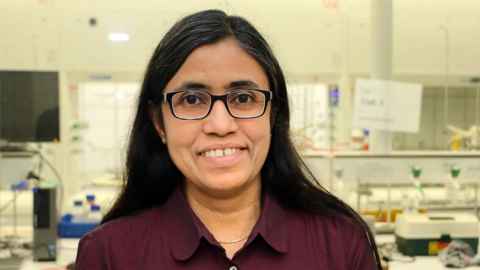An effective solution to protect plants
9 September 2021
A project to protect trees from a destructive pathogen has been granted $1 million over three years from this year’s Endeavour Smart Ideas funding.

Associate Professor Viji Sarojini, from the School of Chemical Sciences who will lead the project, says trees efficiently convert atmospheric carbon dioxide into biomass and so tree-based systems help in meeting New Zealand’s emission reduction targets.
However, this natural path in offsetting carbon emissions is at risk because of destructive plant pathogens, in particular Phytophthora species, that are causing mortality of native and non-native trees as well as economically important horticultural crops in New Zealand (and globally). It is responsible for attacking kauri trees which eventually die.
Current methods used for Phytophthora control have significant shortcomings such as inability to destroy different life stages of Phytophthora, phytotoxicity and resistance development.
This Smart Ideas project investigates a novel approach for plant disease control through the interfacing of Mātauranga Māori with contemporary biochemical science. The approaches commonly used in human disease management will be adapted to horticulture and plant protection scenarios to combat Phytophthora.
Using the unprecedented combination of natural-product derived fragments, we will synthesise new bioactive compounds with novel properties. The new compounds developed from this research will help deactivate the different life stages of Phytophthora species. Our focus will be to develop environmentally benign solutions against this virulent plant pathogen, thereby also reducing environmental impacts from the commonly used chemical pesticides.
“The outcome from this research will help maintain and improve tree health, optimise the ability of trees to sequester carbon, improve soil and water quality, and provide local jobs,” Associate Professor Sarojini says.
“Economic losses to horticultural and forestry sectors, iwi/hapū, investors and Māori growers will be minimised, thus protecting Māori investments since more than 40% of plantation forests are owned by Māori enterprises.”
Our inter-disciplinary team has expertise in chemical synthesis, plant pathology, Mātauranga Māori, soil and ecosystem science, biosecurity, and formulation science. The team includes leaders experienced in integrating research from diverse disciplines, Māori researchers, emerging researchers, and PhD students.
The new environmentally friendly solution for plant protection developed from this research can be applied globally and will enhance New Zealand's reputation in biosecurity and clean green image.
Media contact
Anne Beston | Media adviser
DDI 09 923 3258
Mob 021 970 089
Email a.beston@auckland.ac.nz